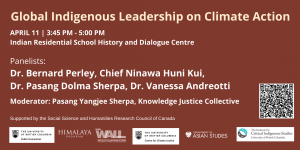Please join us at the Indian Residential School History and Dialogue Centre (1985 Learners’ Walk). For more information and registration, please click here.

In face of intensifying social and ecological crises, this conference asks how we might navigate colonial institutions – from universities to the UN – in ways that question their presumed benevolence and continuity while also mobilizing their resources to reduce harm and support the creation and revitalization of other possibilities for collective existence. Can we find space in the cracks of these institutions to, in the words of conference co-organizer Pasang Yangjee Sherpa, find new ways of living together in the midst of dying?
Panelists: Dr. Bernard Perley, Chief Ninawa Huni Kui, Dr. Pasang Dolma Sherpa, Dr. Vanessa Andreotti
Moderator: Pasang Yangjee Sherpa, Knowledge Justice Collective
Dr. Bernard Perley
Dr. Perley is Maliseet from Tobique First Nation, New Brunswick. He is the director of the Institute for Critical Indigenous Studies at UBC. Dr. Perley’s research and advocacy focuses on the critical analysis of discourses to shift metaphors of “language death and extinction” toward metaphors of “language life and vitality”. He asserts an Indigenous praxis of “emergent vitality” as an empowering stance for communities who are working toward language life. His ongoing writing, research, and teaching integrates language, landscape, and identity to enhance Indigenous language revitalization.
Chief Ninawa Huni Kui
Chief Ninawa Huni Kui is a hereditary leader of the Huni Kui people, a Wall International Indigenous Scholar, and the elected President of the Huni Kui federation of the State of Acre, in the Amazon region. He represents 118 communities and a population of more than 15,000 people. The Huni Kui Indigenous people are part of the Amazon rainforest and put their lives on the line to protect it. Chief Ninawa has been a strong voice against false solutions to the climate crisis and a global advocate for placing Indigenous rights and lives at the centre of the climate and nature emergency agenda.
Dr. Pasang Dolma Sherpa
Pasang Dolma Sherpa is the Executive Director of Center for Indigenous Peoples’ Research & Development (CIPRED). She has been working with Indigenous Peoples, Women, and Local Communities for the recognition of Indigenous peoples’ knowledge, cultural values and customary institutions that have contributed towards sustainable management of forest, ecosystem, biodiversity and climate resilience. Dr. Sherpa’s doctoral research (2018) at Kathmandu University focused on Climate Change Education and its Interfaces with Indigenous Knowledge. She has served as the Co-Chair of International Indigenous Peoples’ Forum on Climate Change (IIPFCC), the Co-Chair of Facilitative Working Group (FWG) of Local Communities and Indigenous Peoples’ Platform (LCIP) of the United Nations Framework Convention on Climate Change (UNFCCC), and on the board of UN-REDD, Participant Committee of FCPF, World Bank. Presently, she is the Chair of IUCN CEESP Specialist Group on Indigenous Peoples’ Customary and Environmental Laws and Human Rights (SPICEH), visiting faculty at Kathmandu University, and continues to serve as a representative in different forums, networks, and institutions at national and international levels.
Dr. Vanessa Andreotti
Dr. Andreotti is currently the Interim Director of the Peter Wall Institute for Advanced Studies at UBC. In July 2023, she will start her appointment as Dean of the Faculty of Education at the University of Victoria.
Dr. Andreotti is a former Canada Research Chair in Race, Inequalities and Global Change and a former David Lam Chair in Multicultural Education. She is the author of Hospicing Modernity: Facing humanity’s wrongs and the implications for social activism (2021) and one of the co-founders of the Gesturing Towards Decolonial Futures (GTDF) Arts/Research Collective. Most of her published articles and OpEds are available at academia.edu.
This session is part of a larger conference titled: From Universities to the UN: Navigating Colonial Institutions at the End of the World as We Know It
For more information regarding the workshop, please click here.
Space is limited to 60 participants, registration is required, and accessibility requests are welcome. Want to join this event virtually? Click here for the conference live stream link.
This conference is co-sponsored by: Center for Climate Justice (CCJ), Institute for Critical Indigenous Studies (CIS), Department of Asian Studies, Peter Wall Institute for Advanced Studies (PWIAS), Himalaya Program, Public Humanities Hub (PHH), Social Science and Humanities Research Center (SSHRC).